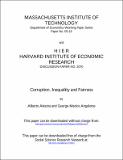| dc.contributor.author | Alesina, Alberto | |
| dc.contributor.author | Angeletos, George-Marios | |
| dc.date.accessioned | 2010-11-09T19:16:35Z | |
| dc.date.issued | 2005 | |
| dc.identifier.citation | Alesina, Alberto, and George-Marios Angeletos. 2005. Corruption, inequality, and fairness. Journal of Monetary Economics 52(7): 1227-1244. | en_US |
| dc.identifier.issn | 0304-3932 | en_US |
| dc.identifier.uri | http://nrs.harvard.edu/urn-3:HUL.InstRepos:4553006 | |
| dc.description.abstract | Bigger governments raise the possibilities for corruption; more corruption may in turn raise the support for redistributive policies that intend to correct the inequality and injustice generated by corruption. We formalize these insights in a simple dynamic model. A positive feedback from past to current levels of taxation and corruption arises either when wealth originating in corruption and rent seeking is considered unfair, or when the ability to engage in corruption is unevenly distributed in the population. This feedback introduces persistence in the size of the government and the levels of corruption and inequality. Multiple steady states exist in some cases. | en_US |
| dc.description.sponsorship | Economics | en_US |
| dc.language.iso | en_US | en_US |
| dc.publisher | Elsevier | en_US |
| dc.relation.isversionof | doi:10.1016/j.jmoneco.2005.05.003 | en_US |
| dash.license | LAA | |
| dc.subject | political economy | en_US |
| dc.subject | redistribution | en_US |
| dc.subject | fairness | en_US |
| dc.subject | inequality | en_US |
| dc.subject | rent seeking | en_US |
| dc.subject | corruption | en_US |
| dc.title | Corruption, Inequality, and Fairness | en_US |
| dc.type | Journal Article | en_US |
| dc.description.version | Author's Original | en_US |
| dc.relation.journal | Journal of Monetary Economics | en_US |
| dash.depositing.author | Alesina, Alberto | |
| dc.date.available | 2010-11-09T19:16:35Z | |
| dc.identifier.doi | 10.1016/j.jmoneco.2005.05.003 | * |
| dash.contributor.affiliated | Alesina, Alberto | |


